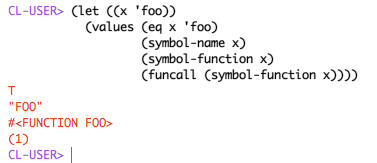Q: Explain the results:
A:
1. `(,'foo) -> (FOO)
when evaluate a symbol 'foo, since there's no need to bind a variable, ,'foo will be FOO.
2. `(`(,'foo)) -> ('(FOO))
though embedded in the double backup quotes, it doesn't metter: 'foo is a symbol not a variable - it doesn't bothered to the binding thing.
3. (let ((x 'foo)) `(`(,x))) -> (`(,x)) with a warning saying that x is never used
when the ,x is met in the 2nd level of data mode, that x doesn't need to be evaluated: it's a literal value, well formed, ready for the 2nd expanding.
4. (let ((x 'foo)) `(`(,',x))) -> ('(FOO))
when ,',x is met in the 2nd level of data mode, the ',x need to be resolved as a symbol (for that '). ,x will be evaluated at the 1st level where there's a binding (x 'foo).
So ,',x will be ,'FOO, then FOO. (see A 1.)
5. (let ((x 'foo)) `(`(,,x))) -> (`(,FOO))
when ,,x is met in the 2nd level embedding of data mode, the ,x after , will be evaluated - on the 1st level. ,x -> FOO, thus ,,x -> ,FOO.
Q: So the embedding affects the expanding?
A: Sure.
`(`(,',x))) => `( ) ; 1st level, (x 'foo); ,x evaluated here
`(,',x)) ; 2nd level, () no binding; ,',x evaluated here
Q: one more level?
A: yeah:
The explanation is quite the same with previous one. But we can try a different approach:
It's the same with the above one. But with the lexical vairable factored out to show the levels.
Q: Why do we need that extra quote ' in the nested let?
A: Because we can't assign FOO directly to a variable. It need to be a symbol.



